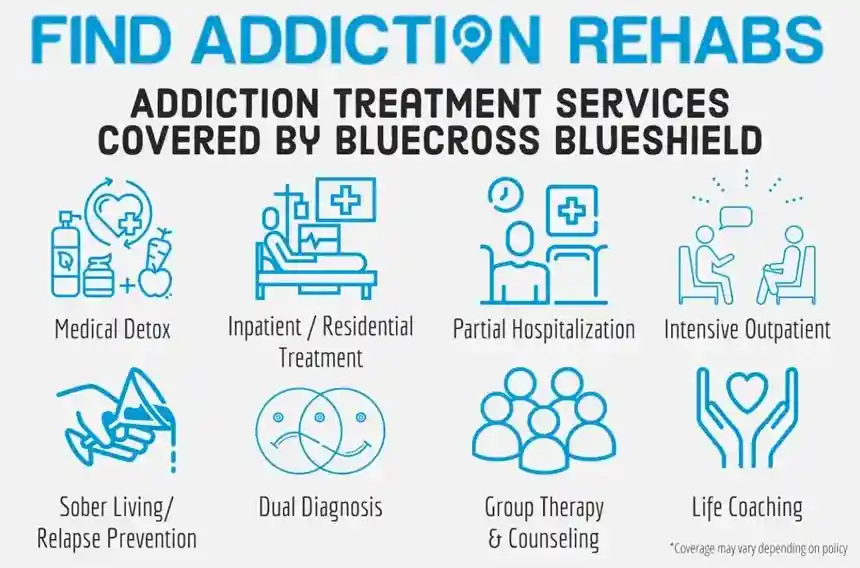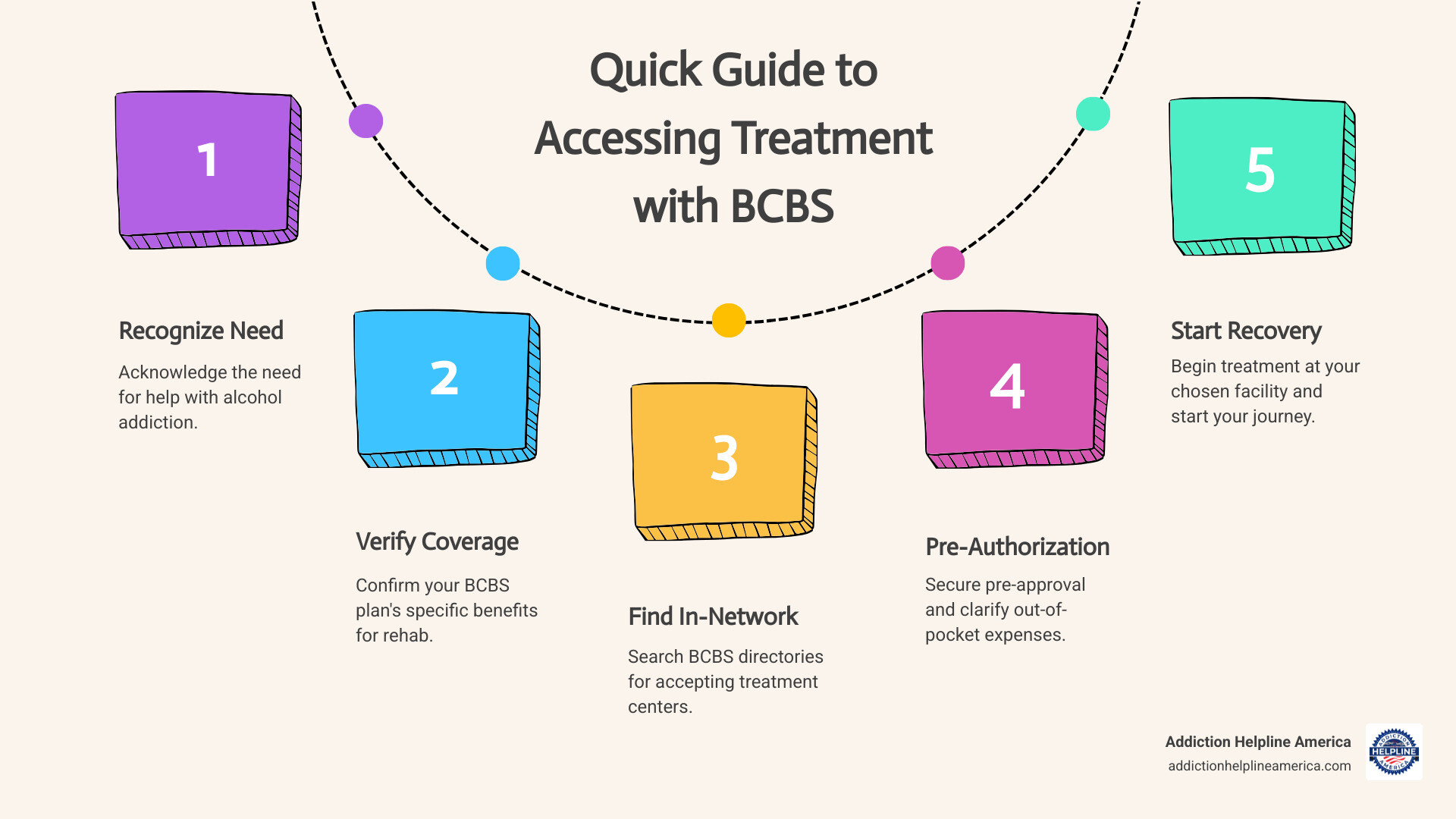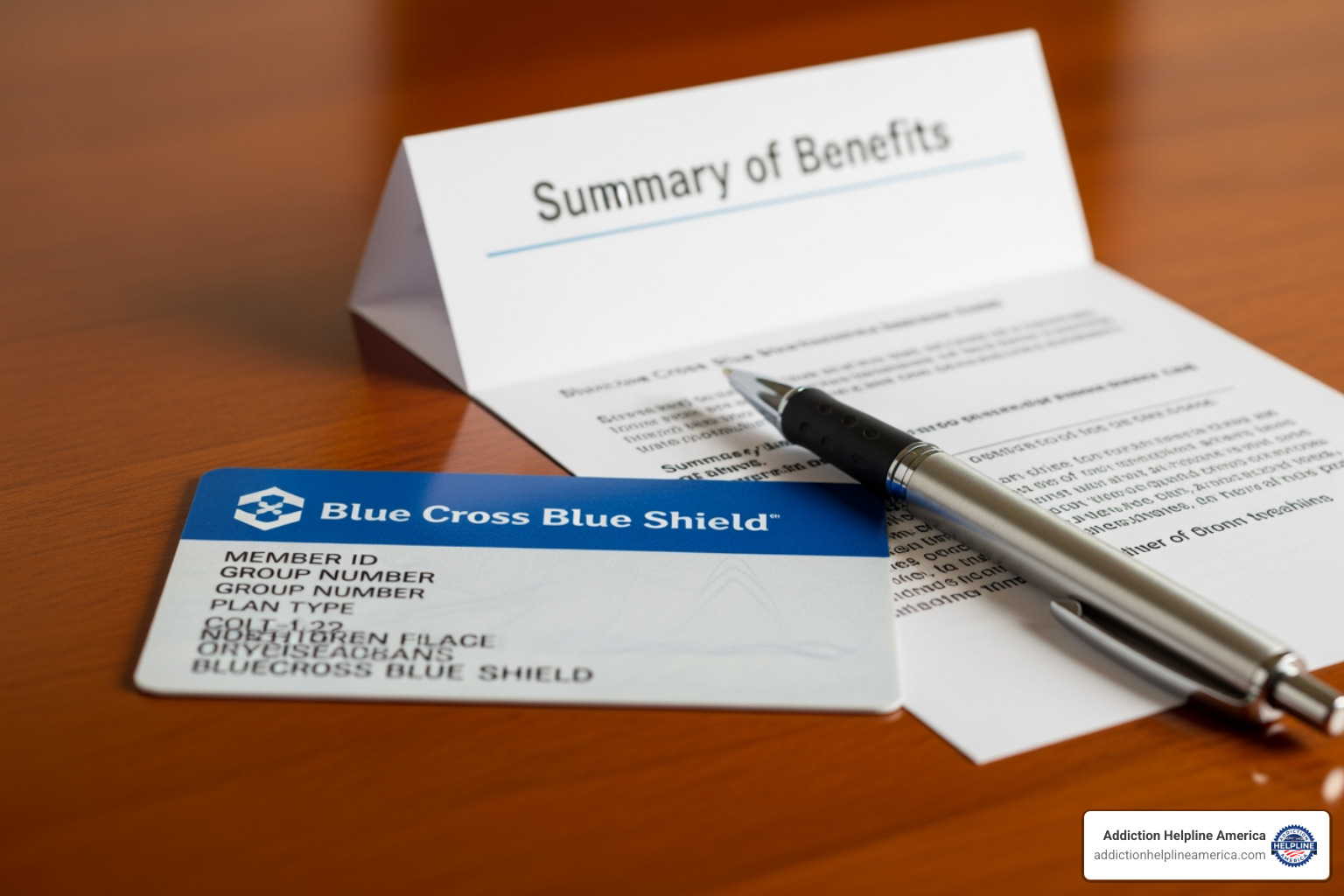
Finding Hope: Navigating Insurance to Access Alcohol Treatment
Alcohol treatment centers that accept BCBS are available nationwide, and most Blue Cross Blue Shield insurance plans cover various levels of care, including detox, inpatient, and outpatient programs. Thanks to the Affordable Care Act (ACA), substance use disorder treatment is considered an essential health benefit, meaning your plan should provide coverage.
Your exact benefits depend on your specific plan, but the path to accessing care is clear:
- Check Your Coverage: Call the number on your BCBS member ID card.
- Find a Provider: Use the BCBS online directory to locate in-network centers.
- Verify Everything: Confirm the center accepts your specific plan and ask about costs like deductibles and copayments before admission.
The good news is that Blue Cross Blue Shield insurance typically covers alcohol addiction treatment. This includes essential services like medical detox, inpatient residential care, and outpatient programs. In Texas alone, the BCBS network includes nearly 80,000 physicians and 500 hospitals, highlighting the vast potential for finding care.
At Addiction Helpline America, we help people steer this process daily. Our specialists can verify your insurance coverage and connect you with appropriate alcohol treatment centers that accept BCBS nationwide, ensuring you maximize your benefits and get the quality care you deserve.
Alcohol treatment centers that accept bcbs vocab explained:
- Virginia alcohol rehab
- drug and alcohol treatment centers near me
- is there free alcohol addiction treatment centers
Understanding Your BCBS Coverage for Alcohol Rehab
Figuring out health insurance can be confusing, but when you’re searching for alcohol treatment centers that accept BCBS, understanding your coverage is essential. Thanks to federal laws like the Affordable Care Act (ACA), most BCBS plans now offer meaningful coverage for addiction treatment.
How the ACA Impacts Your Coverage
The ACA transformed access to addiction treatment. It established substance use disorder treatment as one of ten Essential Health Benefits that most health plans must cover. This means if you bought your BCBS plan through the Healthcare Marketplace or have a small group plan, it must include alcohol addiction treatment.
Key ACA protections include:
- Mental Health Parity: This rule requires insurers to cover mental health and substance use disorder benefits the same way they cover physical health benefits. They can’t impose stricter limits on a stay at a rehab center than they would for a hospital stay for surgery.
- No Lifetime Limits: Insurers can no longer set a dollar limit on what they’ll spend on essential health benefits, including addiction treatment, over the course of your life.
Your specific plan type also affects your coverage:
- HMO (Health Maintenance Organization): Usually requires you to use in-network doctors and get referrals from a primary care physician (PCP) for specialists.
- PPO (Preferred Provider Organization): Offers more flexibility to see specialists without referrals and use out-of-network providers, though at a higher cost.
- EPO (Exclusive Provider Organization): A hybrid plan that doesn’t require referrals but requires you to stay in-network for coverage.
Plans are also categorized by Metal Tiers (Bronze, Silver, Gold, Platinum), which determine how you and your insurer share costs. Bronze plans have lower monthly premiums but higher out-of-pocket costs, while Platinum plans have the highest premiums but cover roughly 90% of your treatment costs.
Many people with alcohol addiction also face co-occurring disorders like depression or anxiety. According to statistics on comorbidity, this affects millions of Americans. The good news is that BCBS plans must provide coverage for treating both conditions together, which is often the key to lasting recovery.
Levels of Care Typically Covered by BCBS
Your BCBS coverage generally supports a full continuum of care. Here are the common levels of treatment for which alcohol treatment centers that accept BCBS are covered:
- Medical Detox: Medically supervised withdrawal to safely manage symptoms. This is a critical first step, and BCBS plans generally provide coverage.
- Inpatient Residential Treatment: 24/7 care in a residential facility. Ideal for severe addiction or those needing a supportive environment.
- Partial Hospitalization Programs (PHP): Intensive day treatment where you return home at night. A step down from inpatient care.
- Intensive Outpatient Programs (IOP): Structured treatment for a few hours, several times a week, allowing you to maintain work or family life.
- Outpatient Counseling: Regular individual or group therapy sessions to provide ongoing support.
- Aftercare Planning: Continued support after formal treatment ends, including therapy and support groups. The counseling components are typically covered.
Your specific BCBS plan determines the exact coverage for each level, including duration and cost-sharing. For a deeper look at how these levels work, you can explore more on alcoholism treatment.
How to Find and Verify Alcohol Treatment Centers that Accept BCBS
Finding the right alcohol treatment centers that accept BCBS requires a few key steps. It’s crucial to be thorough to ensure you have absolute clarity on your coverage before committing to a program.
Not all centers that work with Blue Cross Blue Shield will accept your specific plan. The verification process is about finding a facility that is in-network with your particular plan to save you significant money. You’ll also need to check pre-authorization requirements, as many BCBS plans require approval before you start inpatient rehab or detox. Finally, understand the difference between in-network vs. out-of-network costs. In-network providers have negotiated rates with BCBS, leading to much lower costs for you. Out-of-network care can be dramatically more expensive and may not be covered at all by HMO or EPO plans.
Step 1: Review Your BCBS Policy Documents
Before you search, get familiar with your insurance paperwork. This step can save hours of confusion.
- Locate Key Information: Find your Member ID number and exact plan name on your BCBS insurance card.
- Find Your SBC: Your Summary of Benefits and Coverage (SBC) document, available in your online member portal, explains your policy in plain English.
- Understand Your Costs: Look for your deductibles (what you pay before insurance kicks in), copayments (fixed fees per service), and out-of-pocket maximum (the most you’ll pay in a year). These numbers give you a realistic picture of your personal costs.
Step 2: Use the BCBS Online Provider Finder
BCBS’s online provider finder is your GPS for finding covered care. It shows you which alcohol treatment centers that accept BCBS are in your plan’s network.
- Log In and Search: Go to your state’s BCBS website and log in to search Provider Finder. The system will automatically filter for your network.
- Filter Your Search: Use terms like “Behavioral Health,” “Substance Use Treatment,” or “Addiction Services” to narrow your results. You can also filter by location and facility type (e.g., residential, outpatient).
- Important Tip: Provider networks can change. Always use this tool as a starting point, but confirm the in-network status directly with the facility and BCBS.
Step 3: Call BCBS Member Services Directly
Nothing replaces a direct conversation for getting definitive answers about alcohol treatment centers that accept BCBS.
- Make the Call: Find the Member Services phone number on your ID card. Have your member ID and plan details ready.
- Ask Key Questions: Ask about your benefits for inpatient and outpatient alcohol treatment, your current deductible status, your copayments/coinsurance, and if pre-authorization is required.
- Verify Centers: If you have a facility in mind, ask the representative: “Can you confirm that [facility name] at [address] is in-network for my specific plan?”
- Take Detailed Notes: Document the date, time, representative’s name, and a reference number for the call. Write down the answers you receive. These notes are your proof if a dispute arises later.
At Addiction Helpline America, we know this can be a daunting process. Our team is available 24/7 to help you decode your BCBS benefits and connect with quality alcohol treatment centers that accept BCBS. An experienced advocate can make all the difference.
Spotlight on Quality: Blue Distinction Centers
When searching for alcohol treatment centers that accept BCBS, you want a facility that delivers proven results. The Blue Distinction Centers program helps you find them by taking the guesswork out of identifying quality care.
Think of this as BCBS’s seal of approval. These centers are evaluated on objective criteria to ensure they provide exceptional patient safety and better health outcomes. The program focuses on value-based care, meaning these facilities deliver effective treatment efficiently. Choosing a Blue Distinction Center provides peace of mind that you’re selecting a facility with a proven commitment to lasting recovery.
What are Blue Distinction Centers for Substance Use Treatment?
The Blue Distinction Centers for Substance Use Treatment and Recovery is a BCBS recognition program identifying facilities that deliver exceptional, comprehensive care. These centers have demonstrated a commitment to quality and work effectively with medical professionals through all stages of recovery.
The program has two tiers:
- Blue Distinction Centers (BDC): Meet rigorous quality standards for patient safety and treatment outcomes.
- Blue Distinction Centers+ (BDC+): Meet all BDC quality standards plus specific cost-effectiveness measures, which can translate to lower costs for you.
You can Search for Blue Distinction Centers on the BCBS website, but always verify that a center is in-network with your specific plan.
Benefits of Choosing a Blue Distinction Center
Choosing a Blue Distinction Center offers tangible advantages for your recovery:
- Evidence-Based Practices: These centers use treatment approaches backed by scientific research, giving you the best chance of success.
- Comprehensive Care Coordination: All aspects of your treatment—from detox to aftercare—are seamlessly integrated.
- Improved Patient Outcomes: The program identifies facilities that consistently help people get better and stay better, often showing lower relapse rates.
- Potentially Lower Out-of-Pocket Costs: BDC+ facilities have proven their cost-efficiency, which may result in more manageable expenses for you.
5 Examples of High-Quality Alcohol Treatment Centers
When searching for alcohol treatment centers that accept BCBS, quality is paramount. The right center can mean the difference between a temporary fix and lasting change. Look for markers of quality like accreditation (from The Joint Commission or CARF), licensed staff, evidence-based therapies (like CBT or DBT), and individualized treatment plans that include robust aftercare planning.
Here are five types of high-quality alcohol treatment centers that accept BCBS you might encounter:
1. The Comprehensive Inpatient Facility
Ideal for severe alcohol use disorder or those needing to escape a non-supportive home environment, these centers provide 24/7 medical supervision in a residential setting. Key features include medically managed detox services to ensure safety and comfort during withdrawal, followed by a highly structured environment of individual and group therapy, educational workshops, and peer support. This immersive approach allows you to focus completely on healing.
2. The Specialized Gender-Specific Program
Men and women often face different challenges and societal pressures related to addiction. Gender-specific programs create a custom therapy environment for men or women, providing a safe and supportive environment to address sensitive topics. Therapy has a focus on gender-specific issues in addiction, such as trauma and parenting for women, or societal expectations and anger management for men. This targeted approach can lead to more effective treatment. You can explore Men’s Alcohol Rehab to learn more.
3. The Integrated Dual Diagnosis Center
It’s common for alcohol addiction to co-occur with mental health conditions like depression, anxiety, or PTSD. An integrated dual diagnosis center provides simultaneous treatment for addiction and mental health. The care team includes addiction specialists and mental health professionals who can provide psychiatric services and medication management. This approach addresses underlying issues that may drive alcohol use, significantly improving the chances of long-term recovery by treating the whole person.
4. The Flexible Outpatient Clinic
For those with a stable home environment and work or family commitments, an outpatient clinic can be a perfect fit. These programs allow clients to live at home while attending structured treatment sessions during the day or evening. This balances treatment with work or family life. Options range from Intensive Outpatient Programs (IOP) (several hours, multiple days a week) to more intensive Partial Hospitalization Programs (PHP). Outpatient care is also frequently used as step-down care after an inpatient stay.
5. The Holistic and Family-Involved Center
These centers focus on whole-person wellness, incorporating practices like yoga, meditation, and nutrition alongside traditional therapy to heal the mind, body, and spirit. A key component is family therapy sessions. Addiction impacts the entire family, and rebuilding support systems is crucial for recovery. Family members learn about addiction and healthier communication, helping to heal damaged relationships. To see how this works, you can learn about Family Programs.
At Addiction Helpline America, we can help you sort through these options to find the program that best fits your unique needs and circumstances.
Frequently Asked Questions about BCBS and Alcohol Rehab
Navigating insurance can bring up many questions. Here are concise answers to some of the most common ones about Blue Cross Blue Shield benefits for alcohol rehab.
Does BCBS of Texas cover alcohol addiction treatment?
Yes, absolutely. Blue Cross Blue Shield of Texas (BCBSTX) plans cover substance use disorder treatment as part of their mandated behavioral health services. Under the Affordable Care Act, addiction treatment is an essential health benefit, so BCBSTX is required to provide coverage. This typically includes detox, inpatient, and outpatient care. However, your specific coverage details—like deductibles and copayments—depend on your individual plan. Always call the number on your insurance card to verify your exact costs.
What is the difference between in-network and out-of-network rehab coverage?
This is crucial for managing your costs when looking for alcohol treatment centers that accept BCBS.
- In-network providers have a contract with BCBS to offer services at negotiated rates. Choosing an in-network facility means your insurance will cover a larger portion of the bill, and your out-of-pocket costs (deductible, copayments) will be significantly lower.
- Out-of-network providers do not have a contract with BCBS. They can charge higher rates, and your insurance will cover a much smaller portion, if any. If you have an HMO or EPO plan, out-of-network care is generally not covered at all, except in emergencies. PPO plans offer some out-of-network coverage, but your costs will still be substantially higher.
Always verify a facility is in-network with your specific plan before starting treatment.
Do I need a referral from my doctor to go to rehab with my BCBS plan?
This depends entirely on your plan type.
- PPO (Preferred Provider Organization) plans typically do not require a referral. You have the flexibility to go directly to a specialist or an alcohol treatment center that accepts BCBS.
- HMO (Health Maintenance Organization) plans usually do require a referral. Your primary care physician (PCP) must evaluate you and provide authorization for specialized care like rehab. Without it, your treatment may not be covered.
- EPO (Exclusive Provider Organization) plans generally don’t require referrals but mandate that you stay within the plan’s network.
Don’t guess. Check your plan documents or call the member services number on your BCBS ID card to confirm your plan’s rules.
Your Path to Recovery Starts Here
We’ve covered how to find alcohol treatment centers that accept BCBS, from understanding your coverage under the ACA to identifying high-quality programs. You now have a roadmap to access the help you need.
The key takeaway is that Blue Cross Blue Shield provides robust coverage for various levels of addiction care, including detox, inpatient, and outpatient programs. The coverage exists—the crucial next step is verifying your specific benefits to maximize your coverage and avoid surprise costs.
We want you to hear this clearly: recovery is achievable. You don’t have to have all the answers or do this perfectly. You just have to take the first step.
At Addiction Helpline America, we specialize in helping people steer the process of finding treatment. Our guidance is free, confidential, and personalized. We can help you understand your BCBS benefits and connect you with a high-quality program that aligns with your needs, whether it’s dual diagnosis care, a gender-specific program, or one that involves your family.
You’ve already shown incredible courage by seeking information. Let us walk alongside you for the next part. Reach out to us, and let’s find a rehab center that fits your needs—a place where healing can truly begin. Your path to recovery starts with a single conversation, and we’re ready when you are.
Our helpline is 100%
free & confidential
If you or someone you care about is struggling with drug or alcohol addiction, we can help you explore your recovery options. Don’t face this challenge alone—seek support from us.
Programs
Resources
Will my insurance
cover addiction
treatment?
We're ready to help
Find the best
drug or alcohol treatment
center
Are you or a loved one struggling with addiction? Call today to speak to a treatment expert.
















